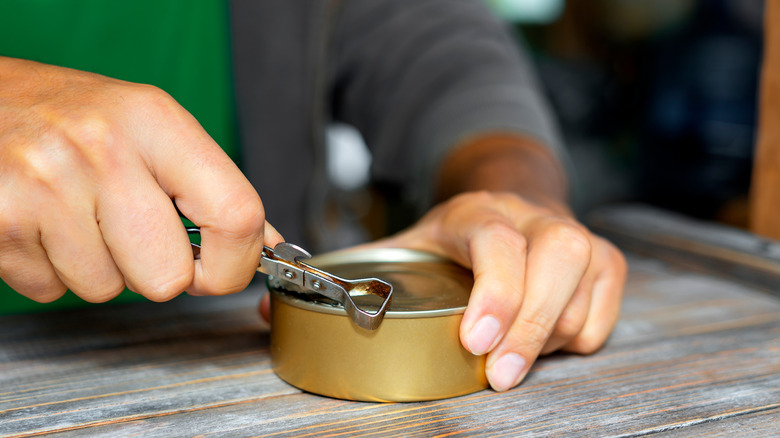The Secret Ingredient That'll Solve Your Rusty Can Opener Problems
In most modern kitchens, can openers see a lot of action. Although a can opener is a kitchen necessity and does a great job of opening cans, all that wear and tear is hard on it. Can openers can get extremely rusty and full of corrosion after a lot of use. This isn't just unsightly — it can make your can opener difficult to use. It can also be unsafe. A dirty can opener blade may bring salmonella, E. coli, and other bacteria to your food.
While you may think you need to replace your rusty can opener, this isn't the case. Chances are the secret ingredient to get your rusty can opener back to new is already in your home. That secret ingredient? White vinegar. White vinegar does a great job of getting rid of rust on your kitchen tools and works very well on can openers as well.
To clean your rusty can opener, simply fill a bowl or container with white vinegar. Then, submerge the can opener completely and leave it for a few hours or overnight. After this, take an old toothbrush and scrub the can opener thoroughly, reaching into every crack and crevice. The rust should come off pretty easily. Follow this up by rinsing with soap and water, and the can opener should look as good as new. After following these steps, dry the can opener completely to get rid of excess moisture.
Preventing can opener rust in the first place
Cleaning a can opener with vinegar can work wonders for getting rid of rust and corrosion, but it's best to avoid this kind of degradation in the first place. In addition to stainless steel cookware, you may also want to consider switching to a stainless steel can opener. A stainless steel can opener will do a much better job of resisting rust and buildup. These tend to be more expensive than can openers made with other materials but can save you time and effort.
To protect a can opener of any material, follow good cleaning habits. After using a can opener, always wash it thoroughly with soap and water. Ensure that all leftover food and residue are wiped away. Use a brush to clean around moving parts and in cracks and crevices that are difficult to reach.
Next, make sure to dry the can opener as thoroughly as you can. Wiping away moisture is essential for preventing rust and buildup. If you have trouble getting it completely dry, consider using a hair dryer to dry the can opener even further and eliminate moisture. If you follow good habits and always wash and dry the can opener after use, it's unlikely to rust as quickly and will stay in great shape for a longer time.

